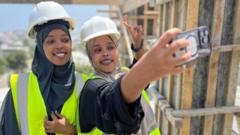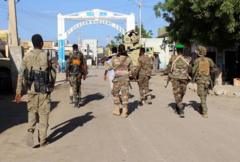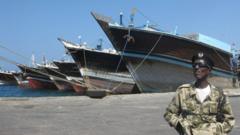As Somalia's capital, Mogadishu, emerges from decades of civil turmoil, a vibrant construction boom is reshaping the city’s landscape. Among those spearheading this transformation are young female engineers Fathi Mohamed Abdi and Saadia Ahmed Omar, who are overseeing transformative projects, including a ten-story residential complex in Hodan District.
The rise of women in engineering in Mogadishu comes amid a flourishing construction environment, but it has not come without skepticism. “When I began, many questioned my abilities,” reflected Abdi, the Chief Operating Officer of Arkan Engineering Services. “They doubted that a young woman could be trusted with a significant investment.” Despite the challenges, both Abdi and Omar, highly regarded in their field with over 30 multimillion-dollar projects to their credit, exemplify the emergence of women's roles in a sector previously dominated by men.
Mogadishu's recovery from the ravages of civil war is evident, as the skyline transforms with new buildings replacing war-torn structures. This urban renewal is a source of pride for the women, who represent a generation that lived through instability but chose to contribute positively instead of seeking refuge abroad. “The city needs our skills,” Omar explains, emphasizing the pivotal role women play in reconstruction and development.
However, the surge in construction raises valid concerns regarding quality and safety. Local architect Siidow Cabdulle Boolaay warns against losing Mogadishu’s unique architectural heritage while highlighting the potential hazards of rapid building practices, particularly regarding the use of substandard materials. Many new structures fail to meet international safety standards, which has led to calls for better regulations and adherence to quality control practices.
Despite these trials, the Somali Engineers Association recognizes the crucial necessity of inclusivity within the industry. Chairman Ibrahim Abdi Heyle noted that the workforce's expanding needs open doors for women, promoting a diverse array of ideas critical to the sector's evolution.
Even as Mogadishu thrives, the infrastructural challenges associated with burgeoning urban growth cannot be overlooked, such as inadequate sewage systems and over-reliance on local boreholes that have raised sustainability alarms. Experts like Christophe Hodder from the UN stress the need for coordinated water management amid escalating urban challenges driven by population influx.
With aspirations for a modernized and resilient Mogadishu, Abdi and Omar take pride in their contributions. “We’re not just building buildings; we’re constructing hope,” Abdi asserts. Reflecting a newfound optimism, both women are not only paving the way for future female professionals but are also vital in foraying into a hopeful era of reconstruction after years of destruction. The collective efforts resonate with a broader narrative: as walls rise in Mogadishu, so too does the resolve of its people to rebuild their nation together.




















